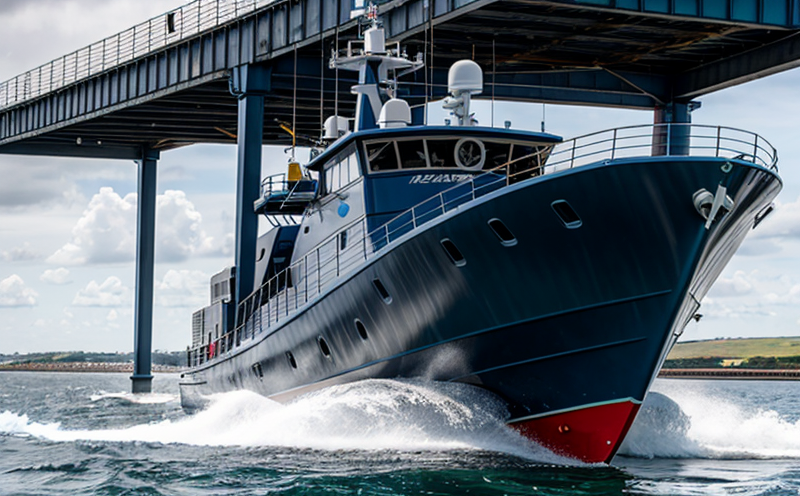ISO 15562 Engine Control Unit (ECU) Compliance Testing
The ISO 15562 standard is a critical reference in ensuring that engine control units (ECUs) operate reliably and safely within the marine environment. This service ensures compliance with these standards, which are vital for maintaining high-quality performance under demanding conditions. The standard covers aspects such as communication protocols, environmental adaptability, and operational robustness of ECU systems.
For quality managers and compliance officers responsible for ensuring regulatory adherence in their organizations, this testing is essential. It guarantees that the ECUs meet international standards set by ISO 15562, which are recognized globally. This service not only ensures legal compliance but also enhances the reliability of the equipment used on marine vessels.
R&D engineers involved in developing new propulsion systems benefit from this testing as it provides insights into how their designs perform under real-world conditions. The rigorous nature of ISO 15562 testing helps identify potential issues early in the development process, allowing for improvements that can lead to safer and more efficient marine engines.
For procurement teams looking to source high-quality components, this service offers peace of mind knowing that all ECUs are thoroughly tested against internationally recognized standards. This ensures that only products meeting stringent requirements are used, thereby enhancing overall product quality and safety.
The testing process involves several stages aimed at verifying the functionality and reliability of ECU systems. Initial steps include thorough inspection and calibration of the units to ensure they meet all specified criteria. Following this, the ECUs undergo a series of functional tests designed specifically for marine applications, including saltwater immersion tests to simulate real-world use.
Advanced instrumentation is utilized throughout these tests to monitor performance parameters in detail. Reporting plays a crucial role in summarizing findings from each test run; detailed reports provide comprehensive data on system behavior under various conditions, highlighting any deviations or areas requiring improvement.
Scope and Methodology
The scope of ISO 15562 Engine Control Unit (ECU) Compliance Testing encompasses a wide range of aspects critical for ensuring the safety and reliability of ECU systems in marine environments. This includes testing communication protocols, environmental adaptability, operational robustness, and more.
| Test Parameters | Description |
|---|---|
| Communication Protocols | Testing ensures that the ECU communicates effectively with other systems onboard, adhering to specified protocols. |
| Environmental Adaptability | Evaluates how well the ECU performs in various environmental conditions relevant to marine operations. |
| Operational Robustness | Assesses the ability of the ECU to operate reliably under expected operating conditions and stress tests. |
| Functional Tests | Involves a series of checks to verify the correct functioning of the ECU in real-world scenarios, including saltwater immersion tests. |
The methodology involves detailed inspection and calibration followed by functional testing using advanced instrumentation. This ensures that all systems meet or exceed international standards set out by ISO 15562.
Eurolab Advantages
- Expertise: Our team of experienced engineers and technicians are well-versed in the latest testing techniques required for compliance with ISO standards.
- State-of-the-Art Facilities: We offer top-notch laboratories equipped with cutting-edge equipment necessary to conduct thorough tests on marine engine control units.
- Comprehensive Reporting: Detailed reports are provided, offering a comprehensive overview of test results and recommendations for any necessary adjustments or improvements.
- Rigorous Quality Control: Our stringent quality control measures ensure that every unit tested meets the highest standards before being certified as compliant.
- Global Recognition: The services provided are widely accepted and trusted by industries around the world, ensuring your compliance efforts are recognized globally.
- Customer Support: Our dedicated customer support team is always available to assist with any questions or concerns you may have regarding our services.
International Acceptance and Recognition
- The ISO 15562 standard has been adopted by numerous countries worldwide, making compliance crucial for manufacturers seeking to operate in international markets.
- A significant number of leading maritime companies have implemented this standard as part of their quality assurance procedures.
- Many regulatory bodies require proof of compliance with ISO 15562 when approving new models or modifications to existing systems.
- Compliance with these standards is a prerequisite for certification by major maritime organizations such as the American Bureau of Shipping (ABS) and Lloyd's Register.
- Many insurance companies also require evidence of compliance before issuing policies covering marine vessels.
The widespread acceptance of ISO 15562 underscores its importance in maintaining high standards across the industry. By ensuring your products comply with these internationally recognized criteria, you demonstrate a commitment to excellence and reliability that is essential in today’s competitive market.





